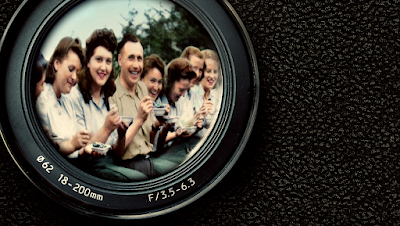4/16/24: Titanique
What: A jukebox musical parody of the Titanic film.
And? Very campy fun.
 |
| Michael Williams, Nicole Parker, and Lindsay Heather Pearce as Jack, Celine Dion, and Rose. Photo by Evan Zimmerman for MurphyMade. |
4/17/24: Water for Elephants
What: The Broadway musical adaptation of Sara Gruen's Depression-era novel about a young man who hops on a circus train to escape family tragedy and, you know, there's an elephant. I don't know, this show's least interesting aspect is its story.
And? I kept trying to figure out, while watching the show, why it wasn't quite working for me. It has a lot of elements I like: inherently theatrical storytelling, a deep bench of talent with the supporting players and ensemble, some striking music and harmonies, and a design team working well in concert with each other. And a lot of the time, this all works. The aerial ballet for the dying horse is heartbreaking and beautiful and a perfect demonstration of what this show is at its best. Sara Gettelfinger's triumphant Broadway return as the aging dancer Barbara is everything perfect, as is Paul Alexander Nolan's seedy turn as the ringmaster (the way he makes every note look effortless should be criminal, as should be his ability to steal nearly every show he's in). It's also a treat to see and hear Wade McCollum (Ernest Shackleton himself!) onstage again. And then the ensemble, which includes a number of alum from the Canadian acrobatic collective The 7 Fingers (Les 7 Doigts de la Main), is a stunningly united company repeatedly drawing gasps and applause from the audience (the co-choreographer and circus designer is Shana Carroll, co-founding artistic director of The 7 Fingers).
Okay, that all sounds great, so what's my problem? The story is kind of eh. The main character, though competently performed by Grant Gustin and Gregg Edelman, is perhaps the least interesting thing onstage. The solo songs aren't nearly as enjoyable as the group numbers. The puppets, though fine, made me long for the craft of Handspring Puppet Company (the group behind the puppetry in War Horse and Life &Times of Michael K, where the puppets were fully infused with breath and life, and I cared). And with all the acrobatics and circus activity, director Jessica Stone hasn't done enough to focus my eye: I didn't always know where to look.
tl;dr: the show is less than the sum of its parts, but some of its parts are extraordinary
 |
| The cast of Water for Elephants. Photo by Matthew Murphy. |
4/19/24: Here There Are Blueberries
What: NYTW presents Tectonic Theater Project's new documentary play about an album of photographs sent to the United States Holocaust Memorial Museum: photographs taken at the Auschwitz concentration camp, but which feature not the prisoners, barracks, or gas chambers, but the SS Officers in their leisure time.
And? The characters in the play ask the question repeatedly: yes, these photographs are important, but should they be the purview of the Holocaust Memorial Museum, a museum whose focus is on humanizing the six million victims, not on giving any more space to nazis. It's a question the play is asking itself, too: is this a story we should be telling? Should we be once again platforming these people? Do we need to hear the descendants of the nazis congratulate themselves on not being as hateful, as complicit, as their parents and grandparents?
The answer is complicated, at least for me. I think it's important these photographs came to light. It's important to remind ourselves that these were regular people who did monstrous things. It's important not to hide the truth (looking at you, characters in Appropriate). It's important to recognize we're not as immune as we want to think we are. In a vacuum, as a piece of theater, this is an interesting investigation and interrogation of the photographs and of the work to identify when they were taken and of whom. But I'm not in a vacuum, so what I also see is one more piece of art about the Holocaust that isn't about Jews. There are an astonishing number of books and films about the worst thing that ever happened to the Jewish people, where the Jewish people are almost a footnote: an anonymous victim, a statistic, a line on a telegram. A column of smoke cropped out of a photograph.
It's good the play recognizes that issue, having the museum's staff argue that this isn't their focus, nor should it be. It's also good that the play gives space to the other album found from Auschwitz: the album of photographs taken of the arrival of the Hungarian Jews before their mass slaughter. I think, without that space given, I would have to write this play off as yet another group of artists missing the fucking point.

No comments:
Post a Comment